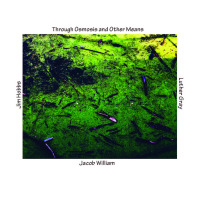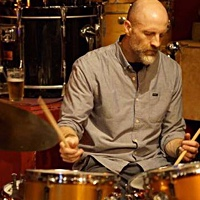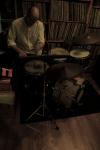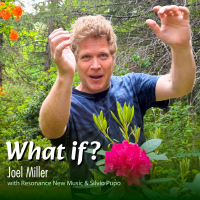Home » Jazz Musicians » Luther Gray
Luther Gray
Jazz drummers, in general, are philosophers when contrasted with the dumb jock model often attributed to boomer era fossil rock. Mr. Gray is a thinking drummer with an expansive kindliness about him that shifts to striking capacities of concentration when he engages his kit.
One commonality I find with this run of drummers is their embrace of flow. Outside now a fat offshore slop front is busy soaking Boston and all the sounds of rain, downpour, focused splashing below the bad roof gutter, car tires mildly hydroplaning on Hampshire street and a syncopation of drippings adds up to some counterpart of flow drumming.
Luther also has water cascades, whitewater rapids and quiet frog splashes in vernal pools worked into the repertoire. Faucet splashes from urban sinks, a slow dripping leak and a morning shower are in there too as well as the various rounds of waves at oceanic edges...flow.
1.What brought you to music?
"When I was a kid my folks had a big furniture cabinet with the record player inside and the speakers built into the corners and a horrible record collection. But they had Ray Charles "What'd I Say." I wore that out. Later my dad gave me his clock radio which gave me the freedom to listen to whatever I wanted in my room. I'd sit for hours listening to the soul station playing Legos. I never followed the directions. I either figured it out by looking at the picture of the spaceship on the box, or I just made up my own."
2.Describe your role models, muses and mentors.
"I learned mostly from records so the list of musicians who've influenced me is long. Thelonious Monk's music is very important to me, as is Art Blakey's.
I was lucky to have 2 mentors, Steve Bagby and Mickey Newman. I studied with Steve in college. Unfortunately he got really sick. So I'd go with him to gigs, help him carry his drums, and finish up when he'd get tired. As a result I had the opportunity to play with people like Ira Sullivan and Red Rodney. In the car he'd tell me stories about sitting in with Coltrane's band, playing with Wayne Shorter, and coming up in Chicago checking out folks like Wilbur Campbell and Steve McCall. We kept in touch until he passed away 2 years ago. I have some cymbals he gave me.
Mickey was the only person who succeeded in teaching me anything specific. He'd show me stuff on the drums for an hour then we'd go sit and listen to records for the rest of the day. He has the best ride cymbal rhythm I've ever heard. I studied with him for 2 years until one day he told me I could come over and hang out anytime I wanted, but I had to figure the rest out myself.
Read moreTags
Jerry Bergonzi: Extra Extra

by Alberto Bazzurro
L'italo-americano Jerry Bergonzi è notoriamente uno dei sommi sacerdoti del tenorsassofonismo contemporaneo--vogliamo definirlo post-coltraniano? nel suo caso più che mai--che sta a indicare di fatto l'ultimo mezzo secolo di musica afroamericana, in pratica ciò che è arrivato dopo lo svolgersi delle avanguardie storiche (in quanto tali, appunto, non perché dopo si siano esaurite, per buona sorte), alle quali non ha mai guardato con troppa attenzione. Il fatto che sia nato (a Boston) nel 1947 ci dice come questo ...
Continue ReadingPandelis Karayorgis Trio: The Hasaan, Hope & Monk Project

by Mark Corroto
Thelonious Monk is quoted as saying, “the piano ain't got no wrong notes." He most certainly said this in response to the criticism of his approach to both composing and performance. In what sounds blasphemous today, critics and other musicians in the early days of bebop flat out said he couldn't play. Perhaps the lesson here is that nonpareil outliers who maintain the conviction of their methods ultimately prevail. That most certainly is the driving force behind pianist Pandelis Karayorgis' ...
Continue ReadingJared Sims: Against All Odds

by Jack Bowers
Any tenor saxophonist with the surname Sims is certain to draw the attention of a seasoned reviewer, if only out of curiosity. The first name in this instance is Jared, not Zoot (well, not John). As it turns out, Sims has an impressive resume as a performer, writer, educator and leader; Against All Odds is at least his tenth album as foreman of his own group. Jared Sims is a capable player who knows his way around a horn; what ...
Continue ReadingPandelis Karayorgis Double Trio: CliffPools

by Neri Pollastri
Ateniese di nascita, ma ormai residente a Boston dal 1985, il pianista Pandelis Karayorgis riunisce in questo album i due piano trio—rispettivamente Cliff e Pools—con i quali aveva registrato per la Driff Records altrettanti lavori negli anni precedenti, dando vita a una formazione atipica: un quintetto con due contrabbassi e due batterie, formalmente un doppio trio che condivide il pianoforte. A fronte dell'organico e dei lunghi studi dedicati dal pianista a Thelonious Monk e Lennie Tristano, non stupisce ...
Continue ReadingPandelis Karayorgis Double Trio: CliffPools

by Mark Corroto
Visit any dog park and you'll notice canines need no instruction on how to play together. Chasing the ball, chasing each other, or investigating a pond is quite instinctive for our furry friends. Apologies for equating the master musicians heard on CliffPools with a pack of dogs, but a ferocious struggle for dominance this is not. Boston-based pianist Pandelis Karayorgis had the idea to merge two of his piano/bass/drums trios into one coterie of kindred spirits. His trio work with ...
Continue ReadingLawnmower: Lawnmower II

by Vincenzo Roggero
Lawnmower è un'idea musicale del batterista Luther Gray (Anthony Braxton, Ken Vandermark, Joe McPhee per citare alcune sue frequentazioni) che nel 2010 si concretizzò sulla label portoghese Clean Feed in un'inedita formazione completata da due chitarre elettriche e da un sassofono. Quattro anni dopo il leader si ripresenta con il fido Jim Hobbs al contralto (Bill Lowe, Taylor Ho Bynum, Joe Morris etc, ) sostituendo le due chitarre con violino e basso elettrico. Così quella miscela di ...
Continue ReadingLawnmower: Lawnmower II

by Troy Collins
Drummer Luther Gray described in the liner notes to West, Lawnmower's 2010 Clean Feed debut, that the record was an attempt to reconcile the various genres he'd worked in throughout his career--an all-inclusive approach that could be traced back to the stylistically diverse music he listened to on a Walkman while mowing lawns in his youth. Lawnmower II, the quartet's sophomore effort, reinforces Gray's initial inspiration, conjuring aural impressions of the lazy, hazy days of summer.The new album ...
Continue ReadingRed Piano Records To Release "Cosmopolitan Greetings" From Frank Carlberg/Joe Morris/Pascal Niggenkemper/Luther Gray

Source:
Jason Byrne, Red Cat Publicity
Available October 16, 2015 Brooklyn-based Red Piano Records is proud to announce the release of Cosmopolitan Greetings, a collective effort by four veterans of the improvised music scene. This album marks the recorded debut of this quartet, with a line up featuring guitar legend Joe Morris, pianist/composer Frank Carlberg, bass wizard Pascal Niggenkemper and unsung drum master Luther Gray, in a program of three Carlberg compositions, and three collective improvisations. In the liner notes Carlberg describes the genesis of Cosmopolitan ...
read more
Joe Morris and Luther Gray - Creatures (Nottwo, 2010)

Source:
Music and More by Tim Niland
Guitarist (and occasional bassist) Joe Morris and drummer Luther Gray have collaborated in a number of settings before, notably in the company of Petr Cancura on saxophone, with whom they made a couple of excellent albums last year. On this occasion they are a duo, creating music which develops in slowly and with nimble interaction building in the duet setting. They are like minded colleagues who share a sense of musical adventure, probing an exploring the sonic thicket they develop. ...
read more
Luther Gray - Lawnmower (Clean Feed)

Source:
Master of a Small House
Drummer Luther Gray, an always reliable sideman in the ensembles of others, makes a welcome debut in the driver's seat on this date for Clean Feed. The underlying significance behind the album's title isn't self-evident so Gray helpfully elucidates it in his succinct liners. The tandem of Walkman listening and mower pushing formed the primary conduit by which he digested music for years. The music is meant to limn the arc of his listening evolution over those inumerable solitary hours. ...
read more
Jim Hobbs, Joe Morris, Luther Gray - The Story of Mankind (Not Two, 2008) ****

Source:
All About Jazz
Saxophonist Jim Hobbs is probably best known as the leader of the insufficiently known Fully Celebrated Orchestra, his quartet with Taylor Ho Bynum, Timo Shanko and Django Corranza, a band that is funky, free and often hard-driving as a rock band.On “The Story Of Mankind", Hobbs joins forces with Joe Morris on bass and Luter Gray on drums, for a slightly but not entirely different approach. The music is still rhythmic and free, but a lot more expressive ...
read more
Jeff Kimmel Trio Featuring Kim Cass and Luther Gray @ The Music Workshop - 6/18

Source:
All About Jazz
Artists-at-Large presents the Jeff Kimmel Trio, featuring Kim Cass and Luther Gray, on Monday, June 18 at 8:30pm, as part of the “Music Workshop" series at the Fraternal Order of Eagles Lodge (15 Dana Ave, Hyde Park, MA; 617-276-3223). A $7 dollar donation is suggested. Jeff Kimmel - bass clarinet Kim Cass - bass Luther Gray - drums Jeff Kimmel: Composer and bass clarinetist Jeff Kimmel has performed with Joe Morris, Allan Chase, Daniel Levin, the ...
read more
Photos
Music
Against All Odds
From: Against All OddsBy Luther Gray













